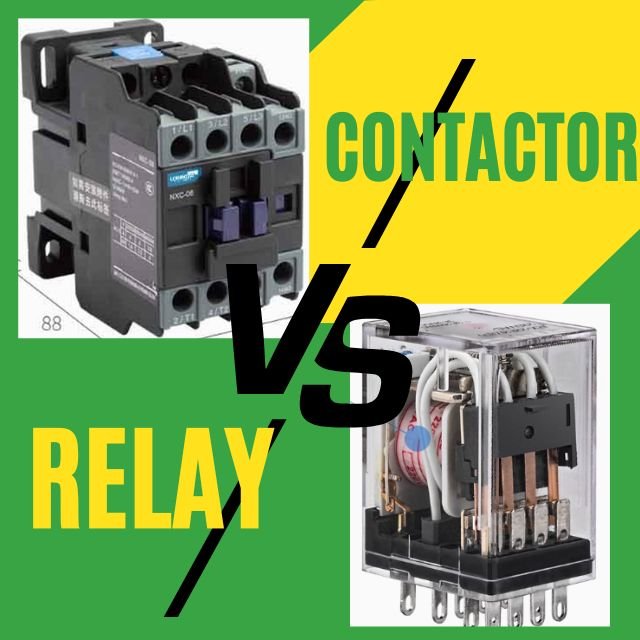Today we are going to talk about the 10 differences between contactors and relays. Note that the relays here refer to the electromagnetic relays or general purpose relays we are familiar with.
Contactors and relays are two common actuators. Their differences are mainly reflected in appearance, structure, function, application scenarios, switching voltage and current, cost etc.
Next, we will explain their differences respectively.
Appearance difference between a contactor and relay

From the appearance point of view, contactors are usually larger than relays and are correspondingly heavier.
Their working principle is the same, that is, when the coil is energized, a magnetic field is generated, which in turn closes or opens the contacts, thereby realizing the connection and disconnection control of the load.
The contactor is mainly composed of a coil, a movable armature, a static armature and contacts. Its contacts are generally made of copper alloy or silver alloy, with large contacts, and this material has excellent wear resistance and conductivity.
Electromagnetic relays also include coils and contacts, and their contacts are also made of copper alloy or silver alloy, with small contacts, good conductivity and low current breaking characteristics.
In the following content, we will explain their components in detail.
Structure
There are also differences in the structure of contactors and relays. Contactors usually include coils, moving iron cores, static iron cores, main contacts, auxiliary contacts, arc extinguishing covers, springs, etc.
Relays are relatively simple in composition, usually consisting of coils, iron cores, contacts, etc. Since the current and voltage allowed to pass are low, electromagnetic relays are often not equipped with arc extinguishing covers.

Applications
Contactors are often used in high-power, heavy-load working scenarios because they can withstand high currents and voltages.
For example, in industrial production, contactors are commonly used to drive large motors. These motors need to operate continuously under stable currents and voltages to ensure uninterrupted production.
Contactors can effectively control the flow of current, and when used in conjunction with a thermal overload relay, they can protect the motor from damage caused by overloading and short circuits.
In contrast, electromagnetic relays are more suitable for low-current, high-frequency control scenarios.
They are often used in low-current control circuits, especially in the control fields of automated equipment and measuring instruments.
Switching voltage and current

In electrical circuits, contactors are frequently used components that can handle higher voltage and current compared to general – purpose relays.
Generally, the standard contactor can handle a maximum voltage of 690 VAC and its maximum current rating can be up to 300 amps.
In contrast, the general – purpose relay is typically rated for up to 250 VAC, with a maximum current capacity of less than 10 amps.
Therefore, the contactor’s switching capacity for voltage and current is much higher than that of the relay.
Accuracy and stability
Both contactors and relays exhibit good stability and high accuracy when utilized for controlling loads with low voltage and minimal current.
In other words, the two products have comparable lifespans. The lifespan of a contactor is approximately 1 million operations, whereas the lifespan of an electromagnetic relay is around 100,000 operations.
Noise
If you have used these two products before, you will find that both products generate noise when the control signal is applied and the contacts are closed.
Although there is a slight difference in noise levels: the contactor is slightly louder than the relay when it operates, the difference is almost negligible.
Control method
The control method of the contactor and relay is the same as our solid state relay, the control signals can be either DC or AC voltage.
Both of them working principle is: when the external control signal such as 12VDC or 220VAC is applied to the control terminal, the contactor or relay can close the circuit to realize load on or off control.
Reliability
There is basically no difference in the reliability of contactors and relays.
When the operating frequency and load current of contactors and relays are high, problems such as poor contact, contact adhesion, and electromagnetic interference( how to avoid this interference, read this article: How to Reduce EMI, Voltage Spiking and Arcing ) are prone to occur, which will affect the stability and reliability of the equipment.
Cost
Contactors have a higher load capacity than relays. However, this also means that contactors typically have more complex materials and manufacturing processes, which contributes to their higher cost.
In contrast, electromagnetic relays are relatively low – cost. This can be attributed to their miniaturization and stable electrical performance, which may allow for more efficient production or lower material requirements.
Conclusion
To sum up, a contactor is a kind of relay, it has the same characteristics as relay, but there are still 10 key differences between contactor and relay, but the main difference is that contactor can withstand higher voltage and larger current, with stronger load capacity, but the price is also higher.
As one of the leading forces in producing all kinds of relays, especially solid state relays, Lorentzzi® can not only provide high-quality products, but also provide solutions for our customers. If you are building a project and want to get professional advice, please contact us or send your questions to shonxu@lorentzzi.com, our team will respond within 24 hours.








